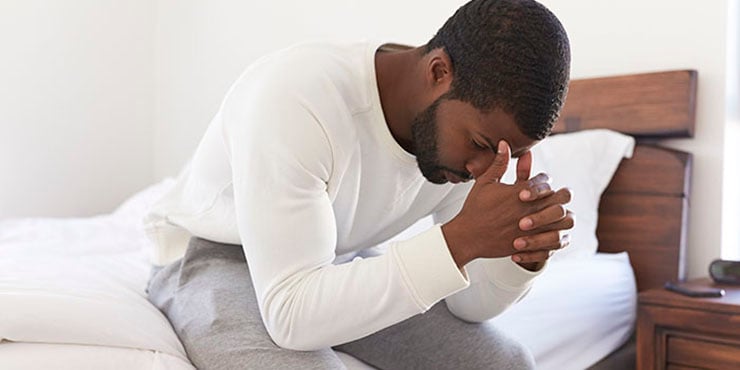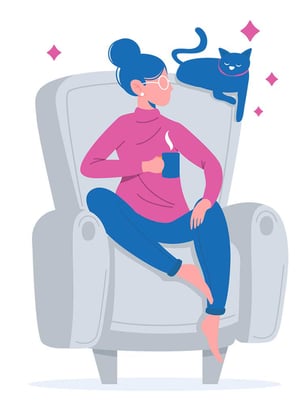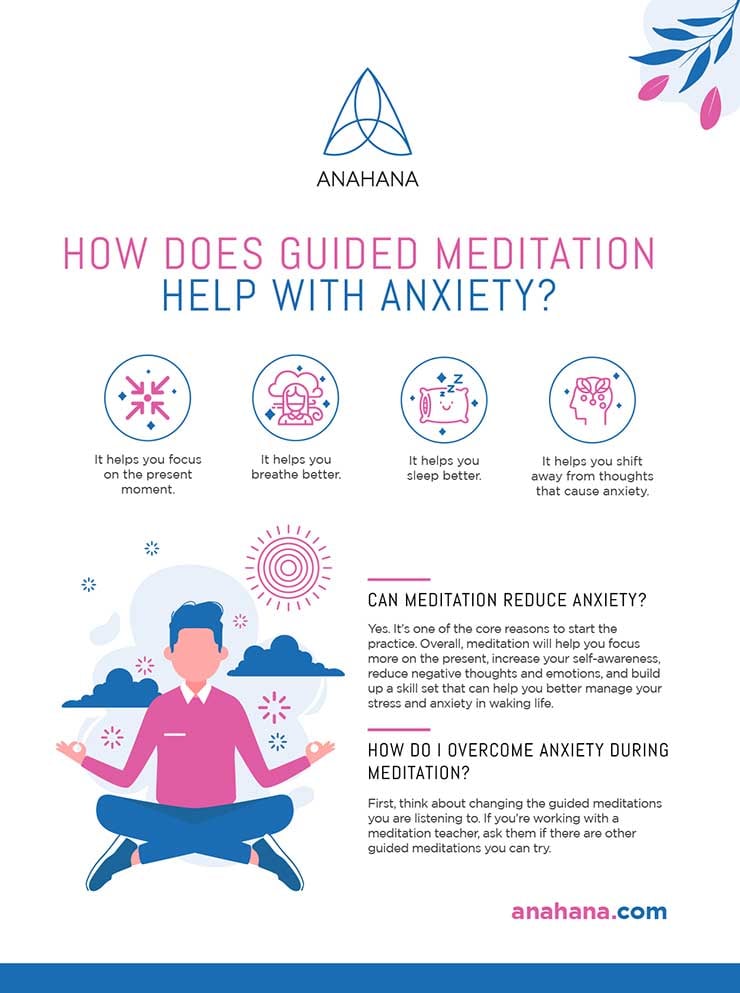
Table of Contents
According to the National Institute of Mental Health, approximately 19 percent of the population has an anxiety disorder. Still, others struggle daily with generalized anxiety and excessive stress.
How Guided Meditation Can Help You

So, how can these individuals — perhaps yourself included — learn to deal with these difficult emotions? Anxiety can be pervasive, igniting every area of your life, from romantic relationships and friendships to work and home life.
Left untreated, it can even cause physical symptoms, often affecting cardiovascular health first and foremost. As heart disease, a medical condition, is the “leading cause of death for men [and] women,” it’s crucial that something is done to combat any cause of cardiovascular stress, if not through meditation but using the health care system.
Enter: Meditation — specifically, guided meditation, a type of meditation led by someone else, preferably a trained and experienced instructor, helping you achieve mindfulness and relaxation based on stress reduction.
Can Guided Meditation Help With Anxiety?
Definitely. In fact, one of the core reasons to start any meditation practice, in general, is to reduce stress and anxiety in your life. These are just some of the benefits of meditation. Guided meditation is the perfect place to start as it puts the responsibility of organizing and scheduling the meditation session on someone who is learned and practiced the method.
Before we move further, however, let's define anxiety in general.
What is Anxiety?
We all have moments of extra excessive stress when our worries and fears seem to get the best of us. This can be defined as anxiety, “an emotion characterized by feelings of tension, worried thoughts and physical changes like increased blood pressure." Anxiety disorders, on the other hand, are more chronic. The anxiety-ridden bouts you experience are intense and persistent if you have an anxiety disorder. You may feel anxious about everyday events that normally wouldn't illicit stressful feelings in other people. For example, someone with an anxiety disorder may feel anxious about going out of the house to get the mail or having a short, personal interaction with someone at the grocery store.
There are several types of anxiety disorders, including generalized anxiety disorder, panic disorder, agoraphobia, separation anxiety disorder, and social anxiety disorder.
Symptoms associated with anxiety and anxiety disorders include:
-
Having a sense of immediate panic and/or despair
-
Sweating
-
Feeling extremely tired or weak
-
Trembling
-
Increased heart rate
-
Gastrointestinal symptoms
-
Extreme feelings of wanting to avoid any physical sensations that induce excessive worry, stress, or anxiety
-
Difficulty controlling feelings of avoidance and stress
-
Tension headaches and migraines
-
High blood pressure
What Is Guided Meditation?
Before defining guided meditation, let's define meditation.
What is Meditation?
Meditation is a practice that aims to train the mind, ultimately creating a heightened level of calm, focus, and spiritual enlightenment and awareness. Meditation practice has its roots in the Buddhist religion, but today, it is practiced in many religions and in secular realms as well. You do not have to be associated with Buddhism or any other religion to practice meditation.
Formally, meditation generally includes sitting in a still manner (often, crossed legged or kneeling on a meditation cushion) and focusing one's mind on the breath or on a specific thought or visualization. Each meditation session will last a set amount of time. Monks who meditate for large sections of their day may meditate for hours at a time. For other practitioners, meditation sessions usually last anywhere from five minutes to half an hour.
What is Guided Meditation?
Guided meditation is only different from other types of meditation in that it is led by an experienced instructor. In other words, some traditional methods of meditation will have the practitioners simply sitting in silence for a set period of time. There may only be guidance by a teacher at the beginning and the end of a session. But with guided meditation, an instructor will direct an individual or group with steps to take throughout the meditation.
A meditation instructor may, for example, tell their students how to sit, how to adjust their eyes, how to breathe, and what to think about or visualize throughout the session. They will then lead their students out of meditation at the end.
Guided meditations, especially those taught by Anahana’s in-home meditation instructors, are excellent for beginners who may require a helping hand getting started with their own practice. Guided meditation can take place in a group or class setting or one-on-one with a teacher. When a teacher is not directly available, the recorded text of a guided meditation may occasionally be used. The benefits of mindfulness meditation are endless!
How Does Guided Meditation Help With Anxiety?
Guided meditation assists with meditation in numerous ways. Here are just four of the anxiety-reducing benefits of meditation that you can expect with guided meditation:
It helps you focus on the present moment.
Focusing on the present is something you can not do when meditating. It is the ever-present goal of all meditation — that you do not dwell on the past or the future, but persist in your focus of the moment at-hand. It’s the only moment you truly have possession over, after all.
Doing this is called mindfulness or mindfulness practice.
Naturally, the practice of mindfulness helps to reduce anxiety because much of anxiety stems from stressing about the past or worrying about the future. For example, you might find yourself worrying about a fight you had with your partner that morning or fretting about a work presentation you have later in the day.
We all know that worrying doesn’t change anything, and it can actually be harmful. Therefore, improving your focus on the present moment helps those worries dissipate, leaving you less stressed and less anxious, with increased inner peace.
It helps you breathe better.
Guided meditation incorporates deep breathing as a standard feature. In fact, slow, steady, deep breathing is a hallmark of nearly all forms of meditation. It is part of the reason meditation is so helpful at combating anxiety, depression, and numerous other mental health disorders.
Still, believe it or not, most people do not breathe correctly. From taking shallow, short breaths to breathing “with the shoulders” (not taking air from the bottom of the lungs), most of us tend to make the same “breathing errors” we’ve made for years without even noticing.
The good news is you can begin “better breathing” practices any time, and guided meditation is an excellent way to facilitate this. Especially when practiced alongside other mental and physical exercises, such as yoga and mindfulness, breathing exercises and deep breathing meditations can transform your waking life in ways you’d never imagine.
It helps you sleep better.
Anxiety begets poor sleep, which begets more anxiety, which begets poor sleep … and on, and on we go.
Everyone should make it their goal to improve their sleep habits since it has famously been a way out of so many mental stressors and physical ailments. Fortunately, guided meditation is extremely helpful in improving sleep. In a recent systematic review and meta-analysis of controlled trials involving how mindfulness meditation (a form of guided meditation) affects sleep, researchers found evidence “that mindfulness meditation interventions significantly improved sleep quality compared with nonspecific active controls".
The specific ways meditation helps improve sleep range from the practice’s ability to calm fretful, worrying thoughts, to its influence on deep breathing — an essential element for better snooze time.
It helps you shift away from thoughts that cause anxiety and stress.
 Anxiety is caused by both “phantom worries” and real and practical life events. “Phantom worries” include things like thinking that someone gave you a dirty look when they probably didn’t or ruminating on whether or not something vague in the future is going to go well. There’s little to nothing you can do about worries or emotions like these.
Anxiety is caused by both “phantom worries” and real and practical life events. “Phantom worries” include things like thinking that someone gave you a dirty look when they probably didn’t or ruminating on whether or not something vague in the future is going to go well. There’s little to nothing you can do about worries or emotions like these.
But actual life worries are real too. Thoughts about a pending medical test you are waiting to get the results for can be truly scary, for example. Fortunately, meditation that focuses on mindfulness (concentrating on the present moment) has been found to assist in reducing anxiety-causing thoughts — even real ones. A recent study carried out by the University of Southern Denmark Faculty of Health Sciences has proven this. The study assigned random healthy subjects to receive a set amount of daily mindfulness meditation training. Another group underwent control conditions.
At the end of the study period, all participants underwent psychological experiments to examine how they reacted to “conditioned fear reactions.” Those who had undergone the mindfulness meditation training were found to have considerably calmer arousal responses to established fear conditions. Essentially, the findings deduced that mindfulness meditation can help individuals forget (and be less reactive to) their fears.
Try a Guided Meditation Practice
Ideally, guided meditation should be performed in real time with an instructor leading the session. However, if you're just starting out with meditation, you may be interested in trying a sample guided meditation on your own. And in a pinch, it is acceptable to record yourself reading the text of a guided meditation in order to play it later and give yourself a directive during your practice.
In this regard, the following is a short, guided meditation for anxiety you might try. Record yourself reading these words, and listen to them when you’d like to calm your fears, worries, anxieties, and any negative emotions.
When speaking the words of the guided meditation, try to use a soft, slow, calming voice. Leave short spaces of time in between each section of the text.
[ Leave approximately 30 seconds at the beginning of the recording to allow yourself to move from your playback device to a position on the floor, in a chair, or on a cushion. ]
“Let’s begin.
Put yourself into a comfortable position on the floor, on a cushion, or in a chair. Center your spine as if there is a string leading from the base of your spine up to the top of your head and to the ceiling.
Close your eyes gently. Allow your hands to rest at your sides or in your lap. Bring attention to your body. Feel your muscles becoming relaxed and loose. Scan your body from head to toe, looking for any areas that feel tight or stressed. Tighten those areas even more for a moment, then release the tension as you exhale.”
[ Leave one to two minutes to allow for complete body awareness. ]
“Now, let's turn your attention to your breathing. Begin with three full, deep breaths.
First, exhale all breath, taking care to breathe out even the air at the bottom most part of your lungs. Now, breathe deeply and as you expand your lungs. Pay attention and feel your abdomen move outward as it fills with air. At the same time, your shoulders should not rise as you draw in air. Count to five: One, two, three, four, five.
Hold the air in your lungs for a count of three: One, two, three.
Now breathe out the air, feeling your abdomen reduce in size as the air exits your lungs and mouth. Exhale for a count of five: One, two, three, four, five.
Repeat this process, breathing in: One, two, three, four, five.
Hold the air: One, two, three.
And release the air: One, two, three, four, five.
Do this a final time, breathing in: One, two, three, four, five.
Hold the air: One, two, three.
And release: One, two, three, four, five.
Resume breathing normally, however is most comfortable for you.
Now, let's do a short visualization.
Imagine that you are sitting on a beach. You are in the exact position you are in now, sitting on the sands of a beautiful ocean landscape and facing the water. No one else is around. The sun is warm and comforting on your skin, and you feel a cool breeze wafting against you in soft gusts. Behind you, the wind lightly rustles the palm trees. You hear the waves lapping against the beach sands. There are no other sounds. Enjoy a few moments of rest here as you continue breathing normally. Simply observe."
[ Allow two to three minutes. ]
“You are still on the beach, hearing the waves and breeze and feeling the sun and wind on your skin. Start to focus on your breath. Let’s take a deep breath, breathing in: One, two, three, four, five.
Hold the air: One, two, three.
And release the air: One, two, three, four, five.
And one more, breathing in: One, two, three, four, five.
Hold the air: One, two, three.
And release the air: One, two, three, four, five.
And a final inhale and exhale, starting by breathing in: One, two, three, four, five.
Hold the air: One, two, three.
And release the air: One, two, three, four, five.
Now, gently return to breathing normally. It’s time to leave your warm spot on the beach. See the ocean waves and warm sand dissolve in your mind’s eye. Slowly, open your eyes, and take in the space around you.”
Guided Meditation For Anxiety: Frequently Asked Questions
Can meditation reduce anxiety?
Yes, although we are discussing guided meditation here, basically any form of meditation can help with anxiety relief. In fact, it's one of the core reasons to start the practice. Overall, meditation will help you focus more on the present, increase your self-awareness, reduce negative thoughts and emotions, and build up a skill set that can help you better manage your stress and anxiety in waking life.
How do I overcome anxiety during meditation?
Though meditation is meant for anxiety and stress management, rather counterintuitively, it can also be common for meditation to actually cause anxiety. This doesn't happen to everyone, but if it happens to you, here are some things you can do.
First, think about changing the guided meditations you are listening to. If you're working with a meditation teacher, ask them if there are other guided meditations you can try. Certain meditations are catered specifically to overcoming anxiety. Second, remember that sometimes, it's important to push through those anxious thoughts and simply stick with the practice until meditation-related anxiety fades away. Most people will sense that this occurs naturally as they continue the practice for a while.
Can meditation help obsessive thoughts?
Yes, if you are looking for ways to deal with anxiety, meditation is one of the best ways to help reduce obsessive thinking — along with mindfulness and yoga. Today, more than ever, people struggle with thinking too much. Furthermore, intrusive thinking often arises at night when you are trying to get to doze off, which inevitably causes numerous additional problems.
Meditation helps with excessive thinking by helping you calm the mind and body and help you think more slowly overall. During meditation practice, you are noticing each and every thought, feeling, emotion, and many physical sensations. This isn't something we regularly do, so slowing down in this way reduces the likelihood that you will continue thinking at a rapid pace and in an obsessive manner.
How long should I meditate for anxiety?
Ideally, meditation for anxiety should be practiced at least once a day for 10 to 20 minutes at a time. But this may be something you need to build up to. If you have never meditated before, start with just a few minutes a day. Even 3 to 5 minutes of daily meditation practice can make a huge difference in your everyday life overall and, specifically, in dealing with anxiety.
Can meditation help with panic attacks?
Yes. Panic attacks are often the result of fight or flight thinking, and meditation is the ideal solution to this extreme thought process that often causes excessive anxiety.
Those who have panic disorder (frequent attacks and time spent excessively stressing and worrying about the future or the past) will find that meditation is an ideal remedy for how to deal with anxiety in this way.
Although you should always speak to your doctor before beginning any treatment plan, meditation for feeling anxiety is something you can start right away — on your own, in a group, or with a personal meditation teacher. It has essentially no negative side effects, and the results for those with panic disorder are outstanding.
What are the best guided meditations for anxiety relief?
There are numerous guided meditation options available. While it is always possible to record yourself reading a guided meditation and to play this when you're ready to meditate, it is always best to receive guidance from a teacher.
Your teacher will not only be a strong, calming presence during your meditation session, but they will also be able to choose a guided meditation that best suits where you are in your life and on your meditation and healing journey.
How often should I use meditation to help with anxiety?
You should use meditation to help with anxiety as often as you need it. A good place to start is just once a day for only a few minutes. Try to choose the time of day when you have the fewest number of activities planned. Perhaps early in the morning or right before bed.
During the early days of your practice, it can be a good idea to vary how you meditate as well. This can help you find the practice that works best for you. Try different types of meditation. For example, you may start with individual guided practice, led by a teacher or your own recorded voice. From there, you can move on to small group or large group meditation. You might even find that the practice helps improve your life so much that you want to learn about becoming a meditation and wellness teacher yourself!
Is it a good idea to sign up for meditation programs or courses?
Absolutely. A program, a course, or an online challenge can be great at keeping you accountable aware of your practice and help you develop meditation skills and habits you can apply to your daily life outside a program. There are hundreds of options to choose from, from mindfulness meditation to mindfulness based stress reduction meditations, self compassion meditation, or simple well being meditation.
References
https://www.nimh.nih.gov/health/statistics/any-anxiety-disorder.shtml
https://www.cdc.gov/heartdisease/facts.htm
https://www.apa.org/topics/anxiety/
https://link.springer.com/article/10.1007/s12671-019-01178-8
https://nyaspubs.onlinelibrary.wiley.com/doi/abs/10.1111/nyas.13996
https://www.nature.com/articles/s41598-019-56167-7


By: Clint Johnson
Clint is the driving force and founder of Anahana. Clint teaches Yoga, Pilates, mindful breathing, and meditation, catering to a global community of students and teachers.
